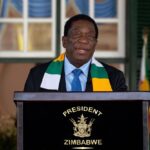Harare – President Emmerson Mnangagwa’s grip on power is facing an unexpected challenge as calls for his impeachment gain traction, despite Zanu PF’s commanding two-thirds majority in Parliament. Political analysts are warning that the 82-year-old leader is not immune to removal, as the battle to succeed him intensifies within the ruling party.
Geza threw the cat among the pigeons last week when he announced that he was pushing for the Zanu PF leader’s impeachment.
He claimed that the president was suffering from serious dementia, which made it impossible for him to run the country effectively.
A draft impeachment motion has been circulating on social media, reportedly driven by a Zanu PF faction opposed to Mnangagwa’s loyalists’ efforts to extend his rule beyond 2028. The move underscores the deep divisions within Zanu PF regarding the succession issue.
The process to impeach Mnangagwa would kick-start when Parliament resumes sitting, probably this week.
Once an impeachment motion has been tabled, the speaker of the National Assembly and president of the Senate are obliged to make necessary arrangements for the joint sitting of the two houses.
Senior lawyer Method Ndlovu in an opinion penned for ZimLive said: “What is required is half of the parliamentarians when the National Assembly and Senate is taken as one” to vote for the impeachment of the president to be removed.
The precedent of removing a sitting president through impeachment was set in November 2017, when Robert Mugabe was forced to resign amidst a military intervention. Zanu PF MPs joined forces with the then-opposition MDC Alliance to initiate impeachment proceedings against Mugabe, ultimately leading to his downfall.
Maxwell Saungweme, a Harare-based political analyst, said Mugabe’s forced resignation showed that it was possible to remove a sitting president through impeachment.
“People did not expect that even Mugabe’s loyalists would defect against him, so I think anything is possible,” Saungweme said
“I think what normally happens in Zanu PF is people are very afraid of either the intelligence or that they are being spied on and so forth, but if, depending on how they have done their mobilisation, maybe it may see the light of day, but it’s not easy.”
However, analysts are divided on the likelihood of Geza’s impeachment bid succeeding.
Vivid Gwede, another Harare-based political analyst, said the decimation of the opposition could work in Mangagwa’s favour if the impeachment motion is pursued.
“An impeachment would require more than a charge sheet, but the ability to influence MPs,” Gwede said.
“Without a strong opposition and with most of the ruling party MPs at the mercy of Mnangagwa, this would be difficult.”
Constitutional lawyer Musa Kika said Zanu PF could count on self-imposed Citizens Coalition for Change (CCC) secretary-general Sengezo Tshabangu to defeat the impeachment motion.
“Because as it stands, Zanu PF has two thirds in the lower house, they don’t have two thirds in the Senate, but if you count Tshabangu and others, they can easily vote for Zanu PF,” Kika said.
“So for anyone who wants to remove Mnangagwa to achieve an impeachment, you must go and convince all those parliamentarians because you need at least half to vote to investigate the impeachment and then secondly you need two thirds to vote to actually impeach.”
Pardon Taodzera, a Harare-based political analyst, suggested that National Assembly speaker Jacob Mudenda would frustrate the impeachment process because he was a Mnangagwa loyalist.
“President Mnangagwa won’t lose sleep over any impeachment threats because the speaker of Parliament, Jacob Mudenda, is a staunch ally,”Taodzera said.
“Mudenda’s control over parliamentary procedures ensures that any move against Mnangagwa would be effectively stifled.”
The infighting in Zanu PF has intensified in recent months, particularly after Mnangagwa’s loyalists began pushing for constitutional amendments to extend his rule to 2030. This campaign has been met with resistance from within the party, further exacerbating factional tensions.
Chiwenga has never publicly supported the 2030 campaign. It is understood that some in Zanu PF are now pushing for his removal from office.
Mnangagwa has on more than four occasions declared in public that he would retire when his second and final term ends.
Ahead of the 2023 elections Mnangagwa said he aware of an internal plot to impeach him soon after the polls.












